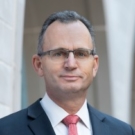Speakers

Joseph Bahout
Associate Professor of Practice and Director of the Issam Fares Institute for Public Policy and International Affairs (IFI), American University of Beirut

Rola El-Husseini
Associate Professor, Department of Political Science, Lund University

Paul Salem
Vice President for International Engagement, Middle East Institute
Moderator
About the Webinar
It has been almost nine months since military attacks and counterattacks began between Israel and Hezbollah on the Israeli-Lebanese border. While both sides have said that they would like to avoid an all-out war, the prospects of such a possibility are increasing daily. Threats and counterthreats abound, with Israeli leaders vowing to return Lebanon to the stone age if said war commences and those of Hezbollah promising to reach every worthy target in Israel. Already, Israel has destroyed many Lebanese border villages and displaced almost 100,000 people, while Hezbollah attacks have resulted in the abandonment of Israeli border towns by tens of thousands of Israelis who have moved to other areas of the country.
With the Israeli war on Gaza continuing to kill Gazans and destroy any semblance of organized human existence without achieving any military or political objectives, it is hard to see how Israel’s leaders can think of starting another with Hezbollah. From its side, and pledging adherence to the “unity of the fronts” concept, Hezbollah vows that it will not end its attacks until Israel ends its war on Gaza. Both sides are indeed primed for a confrontation. On the other hand, diplomatic efforts by the United States, the United Nations, France, and others continue but have not yet produced the conditions necessary for a sustainable cessation of hostilities.
Arab Center Washington DC is convening a panel of experts to discuss the escalation on the Israel-Lebanon border and the potential for an all-out war. Panelists will also explore the ongoing efforts for deterrence and their prospects, as well as the political, humanitarian, and regional implications of further escalation.
Featured image: Shutterstock/Ramiz Dallah


